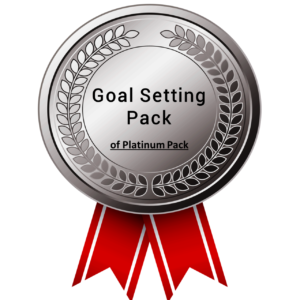Have you ever dreamt of conquering a peak in your career? Maybe you yearn to finally master a new soft skill. Perhaps a personal ambition burns brightly, urging you to achieve something significant. Regardless of your aspirations, the key to transforming those dreams into reality lies in the powerful practice of smart goal setting.
Setting goals provides a roadmap for your journey. It instills clarity about your desired destination and empowers you to navigate the path to get there. However, simply wishing for something isn’t enough. Effective goal setting requires a strategic approach, one that utilizes the SMART framework.
What are SMART Goals?
SMART Goals where ‘SMART’ is an acronym that stands for:
- Specific: Clearly define your goal.
- Measurable: Establish a way to track your progress.
- Achievable: Set a goal that is challenging yet attainable.
- Relevant: Ensure your goal aligns with your overall aspirations.
- Time-bound: Set a deadline for achieving your goal.
By incorporating these elements, you craft SMART goals that are well-defined, actionable, and ultimately, achievable.
Watch below a comprehensive story explaining the use of SMART Goals.
Explanation of SMART Goal:
Let’s delve deeper into each aspect of the SMART framework to understand how it can transform your goal setting process:
Specific:
The foundation of any SMART goal lies in its specificity. Avoid vague aspirations like “be more productive” or “get in better shape.” Instead, translate your desires into clear, concise statements. For example, a specific goal could be:
“Improve my public speaking skills by enrolling in a soft skills training program and delivering three presentations to colleagues within the next quarter.”
Measurable:
SMART goals demand a way to gauge your progress. How will you know if you’re on the right track? Define metrics that allow you to measure your advancement. This could involve:
- Numbers: Increase my sales by 15% within the next six months.
- Milestones: Complete two online courses on coding by the end of the year.
- Observations: Notice a significant improvement in my time management skills after implementing a new system for a month.
Achievable:
SMART goals should be ambitious yet realistic. Striking a balance between challenging yourself and setting yourself up for failure is crucial. Consider your current skills, resources, and time constraints when setting your goals.
For example, aiming to become fluent in a new language within a month might be unrealistic. However, setting a goal to achieve conversational fluency within a year, with dedicated daily practice, is more achievable.
Relevant:
SMART goals should align with your overall values and aspirations. Ask yourself: “Does this goal contribute to my long-term vision?” Ensure your goals are relevant to your personal or professional development and that they genuinely matter to you.
For instance, a goal to learn basic coding may not be relevant if your career aspirations lie in marketing. However, it could be highly relevant if you aim to transition into a web development role.
Time-bound:
SMART goals require a timeframe for completion. Setting a deadline creates a sense of urgency and helps you stay focused. This timeframe should be realistic and consider the complexity of your goal.
For example, learning a new skill might require months of dedicated practice, while completing a specific task might only require a week. Define a time-bound goal that motivates you to take action and track your progress towards achieving it.
Now what are the benefits of using SMART Goals?
SMART goals offer a multitude of benefits for both your personal and professional growth. By incorporating them into your goal setting strategy, you can expect to:
- Increased Clarity and Focus: SMART goals provide a clear direction, eliminating ambiguity and helping you concentrate your efforts on achieving specific outcomes.
- Enhanced Motivation: The act of setting a goal itself can be motivating. However, SMART goals, because they are achievable and time-bound, create a compelling sense of purpose and drive you to take action.
- Improved Time Management: SMART goals with defined deadlines encourage effective time management. You’ll be more likely to create a plan of action and prioritize tasks that contribute directly to achieving your goals.
- Boosted Confidence: As you track your progress and achieve milestones within your SMART goals, you’ll experience a sense of accomplishment. This fuels your confidence and empowers you to tackle more ambitious goals in the future.
- Greater Sense of Direction: SMART goals keep you aligned with your long-term vision. By setting goals that are relevant to your overall aspirations, you ensure you’re moving in the right direction and making progress towards a fulfilling future.
Crafting Powerful SMART Goal: Examples for Personal and Professional Development
Now that you understand the SMART framework, let’s explore how to translate it into action. Here are some SMART goal examples for your personal and professional development:
Personal Development:
Goal: Improve my physical fitness and overall health. (Not SMART)
SMART Goal: Increase my cardiovascular endurance by running three times a week for 30 minutes each session for the next three months. I will track my progress using a fitness tracker and adjust my running time or distance as needed.
Goal: Become a more confident public speaker. (Not SMART)
SMART Goal: Enroll in a public speaking workshop by the end of this month. I will practice delivering a five-minute presentation in front of a mirror or a trusted friend every week for the next two months. Finally, I will volunteer to present a brief report at a team meeting within the next quarter.
Goal: Develop my creative writing skills. (Not SMART)
SMART Goal: Write at least 500 words three times a week for the next six months. I will focus on different writing prompts and genres to refine my writing style. I will also join a local writing group by the end of this month to receive feedback and share my work with fellow writers.
Professional Development:
Goal: Advance my career to a leadership position. (Not SMART)
SMART Goal: Complete a leadership development program offered by my company within the next year. I will actively seek mentorship opportunities from senior leaders in my field. I will also take on additional responsibilities at work, such as leading a new project team, within the next six months to demonstrate my leadership potential.
Goal: Enhance my communication skills in the workplace. (Not SMART)
SMART Goal: Enroll in an online course on effective business communication by the end of this month. I will actively participate in team meetings and discussions, focusing on clear and concise communication. I will also seek feedback from colleagues on my communication style and actively work to improve areas identified for improvement within the next quarter.
Goal: Master a new software program relevant to my field. (Not SMART)
SMART Goal: Complete a comprehensive online training course on the new XYZ software program by the end of next month. I will dedicate at least two hours per week to practicing the software features and applying them to relevant work tasks. I will also aim to achieve certification in the XYZ software program within the next six months.
Remember: These are just a few examples to get you started. The key is to tailor your SMART goals to your specific needs and aspirations.
Developing a Plan of Action for Your SMART Goals
SMART goals are an excellent starting point, but they need a roadmap to become reality. This is where a well-defined plan of action comes in.
Here are some steps to develop a plan of action for your SMART goals:
- Break Down Your Goal: Divide your SMART goal into smaller, more manageable steps. This will make the goal seem less daunting and create a clear sequence of actions you need to take.
- Identify Resources: Determine the resources you’ll need to achieve your goal. This could include books, online courses, software, mentorship opportunities, or financial resources.
- Set Milestones: Establish specific milestones throughout your journey. Reaching these milestones will keep you motivated and provide a sense of accomplishment.
- Schedule Time: Allocate dedicated time in your schedule to work towards your goal. This could be daily practice sessions, attending training workshops, or completing online courses.
- Build in Accountability: Share your goals with a trusted friend, colleague, or mentor. Regularly update them on your progress and seek their support and feedback.
Remember: This is an ongoing process. Regularly monitor your progress and adjust your plan of action as needed. Don’t be afraid to seek additional resources or modify your goals based on your learning and experiences.
Unlocking Your Potential with SMART Goals
By using SMART goals and creating a plan of action, you empower yourself to achieve anything you set your mind to. This approach translates to both personal and professional development. You can use SMART goals to master new soft skills, advance your career, improve your health, or pursue any personal passion.
So, what are you waiting for? Start formulating your SMART goals today and unlock your full potential for personal and professional growth!
Also read 11 Important Soft Skills for Success.
Ready to take action and achieve your goals faster?
Stop Spending your Precious Time & Effort on Designing & Developing your Soft Skills Training Material. Our Ready-made Soft Skills Training Material is:
- Designed & Developed for Actual Training Programs Participants.
- Directly usable in your Training Programs immediately.
- Fully Editable and Customizable to fit your specific needs.
The Goal Setting Pack Contents:
- GS1 SMART Goal Setting – 49 slides PPT
- GS2 Target Orientation – 20 slides PPT
- GS3 Steps to Goal Setting – 15 slides PPT
- GS4 Blue Print for Success Goal Sheet & Action Plan Exercise – Worksheet
- GS5 Goal Setting Questionnaire – Questionnaire
Invest in your training program’s success and empower your participants to achieve their full potential. Get your Ready-made Soft Skills Training Material – Goal Setting Pack today!
-
Product on sale
 Pack14 – Goal SettingOriginal price was: $39.00.$19.50Current price is: $19.50.
Pack14 – Goal SettingOriginal price was: $39.00.$19.50Current price is: $19.50.

